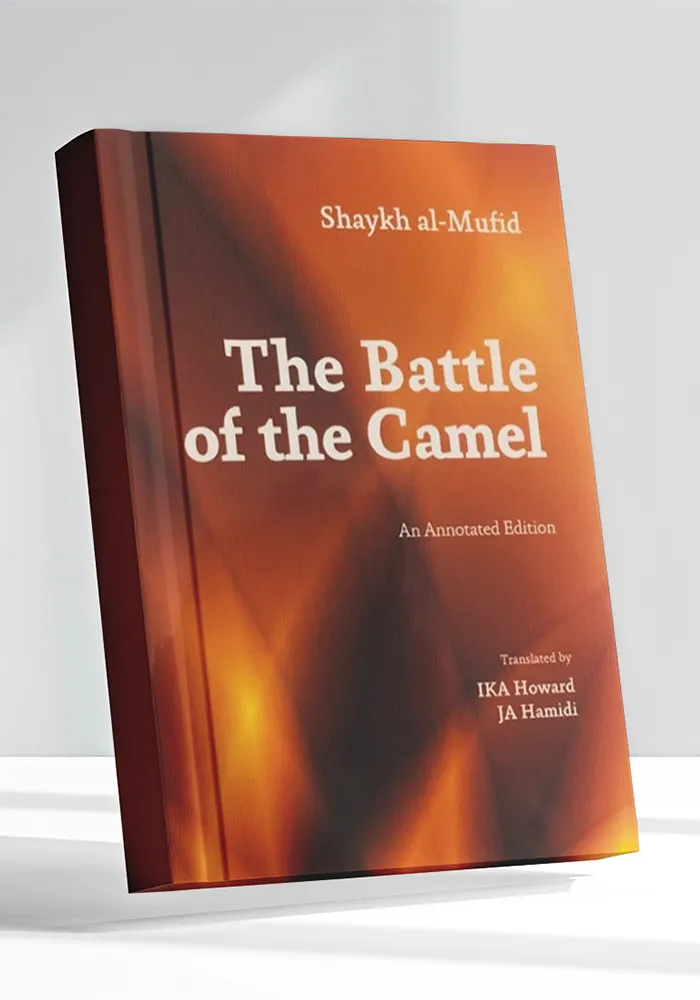The Battle of the Camel
The Battle of the Camel
Written by: Shaykh al-Mufid
Bibliography of the Book:
- Author: Shaykh al-Mufid
- Translated by: IKA Howard & JA Hamidi
- ISBN: 9781908031020
- Publisher: Muhammadi Trust of GB & NI
- First Published: July 2014
- Pages: 480
- Language: English
About the Book:
The first major battle between two groups of Muslims marks one of the most shocking moments in Islamic history, leaving consequences that have never been fully erased. The Battle of the Camel was an extraordinary confrontation: on one side stood Imam Ali (peace be upon him) as the Caliph and leader, recognised at the time (36 AH) as the elected ruler of most Muslims, bearing the title of Amir al-Mu’minin. On the other side, the battlefield featured one of the wives of the Prophet Muhammad (peace and blessings be upon him) and two of his most prominent and loyal companions, Talha and Zubair.
This unexpected and unprecedented clash culminated in a battle named after the reddish camel of Umm al-Mu’minin, which became the defining symbol of the conflict. According to various Sunni and Shia accounts, the battle claimed between 15,000 and 25,000 lives. Many of the Prophet’s most distinguished companions were killed, and the tragedy was so profound that Imam Ali (peace be upon him) is reported to have walked among the dead for hours after the battle, weeping over the devastating loss.
Countless books and narratives have been written about this strange and consequential event and its causes. One of the most important works is The Battle of the Camel by Sheikh Mufid. Renowned for his meticulous scholarship and rigorous inquiry, Sheikh Mufid approaches the subject with the precision of a thorough historian. In this work, he carefully chronicles the origins and outcomes of the battle.
The Battle of the Camel stands as one of the most significant surviving sources on this pivotal moment in early Islamic history. It reflects Sheikh Mufid’s profound intellect and sensitivity, as well as his conviction that documenting this battle was a necessary duty—far more so, in his view, than writing about other conflicts such as the Battle of Siffin or other skirmishes during the time of Imam Ali (peace be upon him).
A Word from the Author
‘This is a summary of the accounts of [the Battle of] Basra, the reason for the civil discord there and the doctrines of the theoreticians in judging the civil discord there. We have reported them with brevity. The reports which we have presented are on the authority of the non-Shi’a narrators to the exclusion of the Shi’a narrators. Moreover, we have not recorded what the Shi’a report in their repudiation of them since the purpose of our presentation of this book was to detail the account of the civil discord at Basra, the fighting and actions which took place there, to explain the obstinacy of the people towards the Commander of the Faithful and that their intention in fighting him was to shed his blood without there being any doubt in his affair and any excuse for the opposition they made against him. The purpose is also to elucidate what the reports have implied of the fallacy of the view of those who claim that the people repented from their transgression, their error in waging war against the Commander of the Faithful and the invalidity of the doctrine of those of the Mu‘tazila, the Murji’a and the Ḥashwīyya who hold such a position.’
About the Author
Abu Abdullah Muhammad al-Harithi al-Baghdadi, known as al-Shaykh al-Mufid (d. 413/1022), is a pivotal figure in Shi’a history. A student of the renowned scholar Ibn Babuyah al-Qummi, Shaykh al-Mufid himself taught prominent theologians like al-Shaykh al-Murtada. He authored around 170 treatises focusing on theology, jurisprudence, and hadith, solidifying his position as a leading scholar in the Shi’a tradition. His works have held a central place in Shi’a scholarly curricula for centuries and remain foundational texts in contemporary seminaries, alongside those of his teacher and other luminaries such as al-Kulayni and Shaykh Muhammad al-Tusi.
Endorsement of the book by Hamid Algar, Professor Emeritus, University of California, Berkeley:
‘Shaykh al-Mufîd (d. 413/1022), one of the major figures in the development of the Shi’i scholarly tradition, is best known for his Kitâb al-Irshâd, an account of the lives of the Imams of the Ahl al-Bayt. Particularly important among his other works is his al-Jamal wa ‘n-Nusra, an account of the Battle of the Camel and the events leading up to it including also a delineation of the positions adopted by various groups and schools of thought. Readers to whom the Arabic original is inaccessible now have a serviceable translation of this valuable work at their disposal.’
news via inbox
Subscribe to the newsletter.




